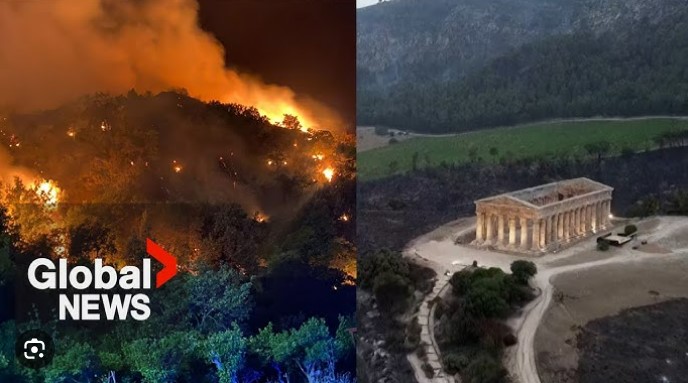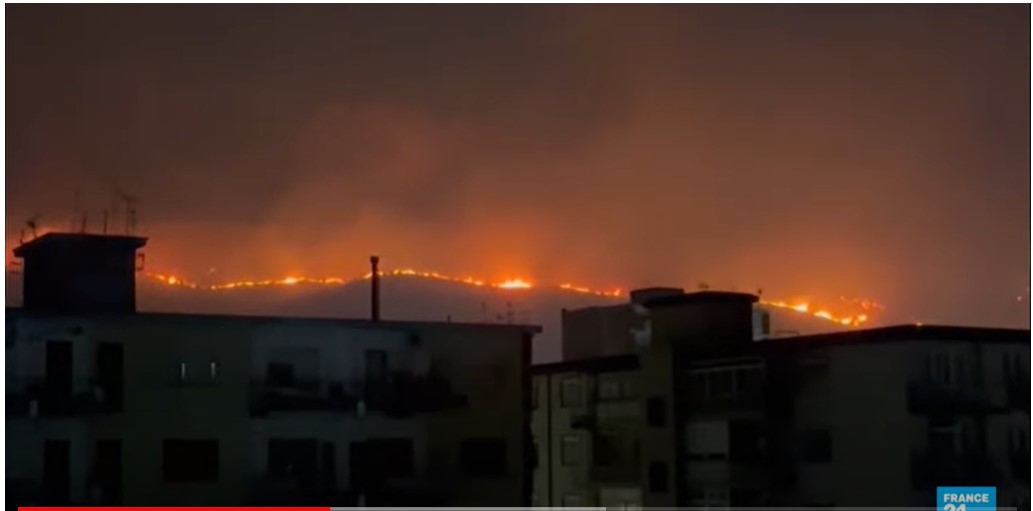Sicily, one of Italy’s most popular tourist destinations, has been hit hard by wildfires that have ravaged its forests, farmlands, and coastal areas. The fires, fueled by high temperatures and strong winds, have forced thousands of people to evacuate their homes and hotels, especially in the city of Catania and its surroundings.
Just this week a fire inside a terminal building caused the near-total closure of its biggest airport in Catania on the east of the island. Palermo airport was also closed for a few hours on Tuesday because of a wildfire nearby. The fires have also spread to other parts of Sicily, such as Agrigento, and Messina, where firefighters and volunteers are working tirelessly to prevent further damage.
“I hope that tourist flows in the areas affected by the fires will not suffer losses,” Civil Protection Minister Nello Musumeci, a Sicilian, told the La Stampa newspaper.
“The risk … is there and it is understandable”, he added.
He is right in worrying about how this will affect the tourist industry, it is a main source of income for the area, for the country and for all of Europe.

It accounts for about 12% of Sicily’s GDP and employs more than 100,000 people. Many tourists have had to cancel or cut short their trips due to the smoke, ash, and danger posed by the flames. Some have also complained about the lack of assistance or information from local authorities and tour operators. The wildfires have exposed the vulnerability of Sicily’s tourism industry to climate change and natural disasters, as well as the need for more prevention and preparedness measures to protect its natural and cultural heritage.
This situation is grave not only for Italy but for much of Europe as well.
The recent surge of wildfires across Europe has had a significant impact on tourism, especially in countries that rely heavily on summer visitors. According to the European Travel Commission, the number of international arrivals in Europe dropped by 10% in July compared to the same month last year, and the outlook for August is not much better. The main reasons for this decline are the travel restrictions, health risks, and environmental concerns associated with the wildfires, which have affected popular destinations such as Greece, Turkey, Italy, Spain, and France. Some tourists have cancelled or postponed their trips, while others have opted for alternative locations that are less affected by the fires.
According to the European Forest Fire Information System (EFFIS), the number of wildfires in the first half of 2021 was three times the annual average for the previous decade, affecting more than 250,000 hectares of land.

The tourism sector, which accounts for about 10% of the European GDP and employs millions of people, is crying out for more support from the governments and the EU. The European Commission has already allocated €200 million to help the affected countries fight the fires and provide humanitarian aid, but more funds and coordination are needed to mitigate the economic and social consequences of this disaster.
Climate change is actually not the main cause of the wildfires, it only accounts for about 10%, while more than 90% are ascribed to human activity: arson and carelessness chief among these. A further small percentage occur due to natural causes such as lightning. Climate change is only a contributing factor, as it increases the frequency and intensity of heat waves, droughts, and strong winds that create favorable conditions for fire ignition and spread.
Therefore, preventing and combating wildfires requires a coordinated and multi-level approach that involves awareness-raising, law enforcement, fire management, risk assessment, and emergency response. It also requires enhancing the resilience and adaptation of the tourism sector to cope with the effects of wildfires and other climate-related hazards.

The wildfires have claimed at least three lives in Sicily, and injured dozens more. They have also caused immense environmental damage, destroying thousands of hectares of forests, crops, and wildlife habitats.
The government was set to meet in Rome later Wednesday to declare a state of emergency in regions affected by natural disasters and introduce a special furlough scheme for workers most exposed to the heatwave. But it is clear that steps must be taken to safeguard the health of the tourist industry and more importantly, that of people and the environment.












